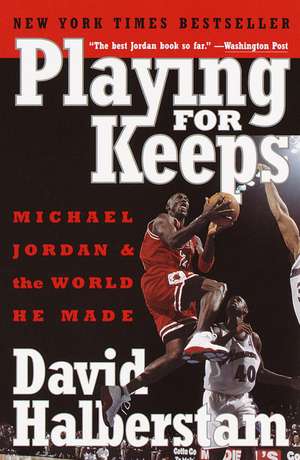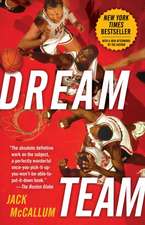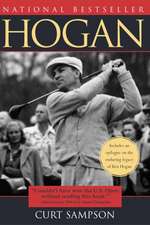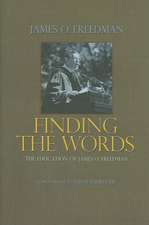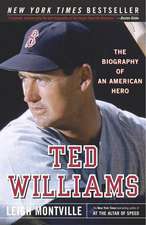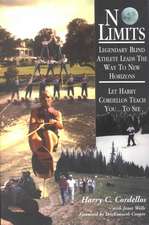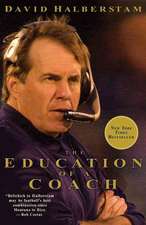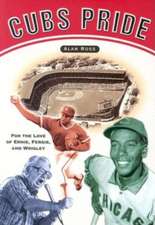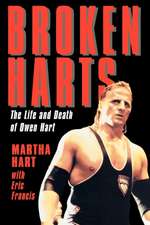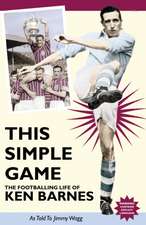Playing for Keeps: Michael Jordan and the World He Made
Autor David Halberstamen Limba Engleză Paperback – 31 ian 2000 – vârsta de la 15 până la 18 ani
Preț: 101.88 lei
Nou
Puncte Express: 153
Preț estimativ în valută:
19.49€ • 20.41$ • 16.13£
19.49€ • 20.41$ • 16.13£
Carte disponibilă
Livrare economică 17-31 martie
Preluare comenzi: 021 569.72.76
Specificații
ISBN-13: 9780767904445
ISBN-10: 0767904443
Pagini: 448
Dimensiuni: 132 x 201 x 25 mm
Greutate: 0.36 kg
Editura: Three Rivers Press (CA)
ISBN-10: 0767904443
Pagini: 448
Dimensiuni: 132 x 201 x 25 mm
Greutate: 0.36 kg
Editura: Three Rivers Press (CA)
Notă biografică
David Halberstam is the author of fifteen books, including The Best and the Brightest, The Powers That Be, The Reckoning, The Breaks of the Game, Summer of '49, October 1964, and The Amateurs. He has received every major journalistic award, including the Pulitzer Prize, and is a member of the Society of American Historians.
Extras
In the fourteen years that Michael Jordan played in the NBA, no one other than a handful of players benefited more from the league's rising affluence and the shift in power from owners to players than David Falk. A relatively junior sports agent in the beginning of the era, Falk was by 1998 not merely the most affluent agent ever to represent basketball players but one of the two or three most influential men in the sport of basketball, a man whose power was said to rival that of David Stern himself. If the legal, economic, and technological changes that took place in the eighties and nineties had been good for players, they were arguably even better for agents. Since he first surfaced as an agent, he had split twice with partners: Early on, even before he was part of Jordan's team, he and Donald Dell split from Frank Craighill and Lee Fentress, and eventually he split off from Dell in what was considered a rather bitter professional divorce. In 1998 he sold his company to a larger firm, one that specialized in producing live entertainment in arenas around the country. The price was an estimated $100 million, and as part of the deal, Falk stayed on to run his part of the company. A press release announcing the sale noted that Falk's old company, FAME (Falk Associates Management Enterprises), "represented an unprecedented 6 first-round draft picks in the NBA, negotiated over $400 million in contracts for its free-agent clients, and negotiated four of the five largest contracts in team sports history."
No one doubted David Falk's ability and intelligence, but if there was one thing that bothered people who cared about the league and the game in the broadest sense, it was whether he had any sense of a larger good, a belief that the greater good and health of the game was still something of an issue. Some felt that there was a danger that the size of some players' contracts exploited the vulnerability of varying franchises and threatened the long-range stability of the league. Falk seemed to enjoy his power as much as his wealth, the ability not to return calls and to make other people, particularly owners, feel vulnerable to him. "Be wary of David, and be particularly careful when he starts telling you how much he respects you," an owner once noted. "That's when you're going to either lose your wallet or your franchise player--it's his way of telling you he's more powerful than you are."
In the summer of 1998, as the league and the players' union prepared for a major battle over contract rules and the owners prepared for a lockout of the players, a number of Falk clients, including Patrick Ewing, Dikembe Mutombo, and Alonzo Mourning, had risen (hardly by chance) to positions of leadership in the union. That did not mean that it was simply Falk against the owners, for there were a number of other agents equally active on the players' side, but the issues, particularly the question of a soft or hard salary cap, seemed more about the contract freedoms enjoyed by the elite of the league than the earning power of most players. Certainly a number of people knowledgeable about the NBA saw the lockout as something of a struggle between Stern and Falk, and certainly when David Falk spoke to reporters that fall, he implied that Michael Jordan might be willing to come back for one more season--if David Stern did not block the way. As the lockout continued, it became increasingly clear that Falk was a critically important figure on the union side and that the issues seemed to affect his handful of elite clients more than they did most of the players. In an unusually scathing column the influential New York Daily News columnist Mike Lupica wrote, "There may be worse phonies in sports than David Falk, but it is hard to come up with one today." Falk was, Lupica wrote, "a Rasputin coming off the bench" in these negotiations, the rare person who could make a writer root for a sports owner.
As for David Stern, in the late summer of 1998, as labor tensions escalated and a lockout became ever more likely, he seemed to some of his friends to be significantly sadder, if not actually melancholy. It was as if he was lamenting the loss of a once-vital human connection to the league's players, what he thought of as a special partnership with them. He grew a beard, which he vowed he would not shave until a new labor agreement was worked out. At the same time, ever a world-class marketer, he opened a giant new NBA store on Fifth Avenue in New York City, filled with almost any kind of clothing and trinket that could carry an NBA logo. Soon to come are NBA restaurants in a large number of cities.
Stern was very much aware that his longtime critics, people who hated the way the game had evolved in recent years--with its Dream Team conquest of lesser mortals at the Olympic competition, its affluent corporate-sponsorship deals, its big television contracts, its fancy new arenas with their luxury boxes and mandatory deafening noise, its growing separation of players from the media--thought he was being hoisted with his own petard. They believed that the league, with Stern as its master image maker had become too marketing-oriented in its struggle for parity with other major sports. Worst of all, in the process of gaining such stunning success, it had inevitably helped create the attitude among altogether too many players that they were beyond traditional norms of accountability, economically and socially outside the reach and control of society, and that the NBA's phenomenal (and unlikely) growth of the eighties and nineties was not some benign technological and societal fluke but nothing less than their just due. As their salaries had grown at such a remarkable rate in the past decade, so had their separation from reality.
Stern sometimes joked privately with friends that he could be arrested for operating under false pretenses in having for so long minimized the warts and maximized the artistry of the players and the game and above all for having tried to diminish the idea that modern athletes were, well . . . greedy. He liked to talk nostalgically about his early days as a league executive, when he worked with an earlier generation of labor leaders and players, men who felt a sense of partnership and shared objectives. Everyone was learning the hard way that a shared partnership was a good deal more difficult in flush times than in hard times. What bothered him now, Stern told some associates, was that players' and agents' memories were so short--almost no one seemed to remember how recently the league could not get itself on prime time for playoff games.
What made Stern's sadness particularly poignant was the fact that he had never been simply the owners' man, as was so often the case in big-time sports. He loved the players and the game itself and was committed to both, and he always had a broad sense of the larger health of the sport, a health that he believed began and ended with the public's respect and emotional investment in the players. In the words of Bob Ryan, "In that critical period when the NBA was just beginning to become successful, and a critical ingredient of it was the labor agreements which the league worked out with the union, I could as easily have envisioned David Stern heading the union and Larry Fleisher [the head of the union] being the commissioner--because there was no real difference in their love of the game, and the vision they both had of what they wanted to happen."
That was certainly no longer true. It all changed under the weight of so much prosperity. Revenue and salaries had gone up in staggering increments in recent years, tearing asunder all kinds of partnerships. When Stern came into the league as a relatively junior executive in 1978, the total of all players' salaries was around $40 million; only twenty years later, Michael Jordan made close to that much himself in one year, his team's payroll was roughly twice as much, and the total for the league was around $1 billion annually. That meant that salaries had gone up roughly 2500% in the twenty-year period. But a new generation of players represented by a new generation of agents had little interest in the hoary stories from what seemed like another century about how far they had all come in so short a time. There was no small amount of irony in the fact that the agent who had pulled off the Kevin Garnett deal, which more than anything else united the owners in bringing on the lockout, was Eric Fleisher, son of the late Larry Fleisher, the first head of the union and an agent in his own right, a man once despised by the owners of his day but now regarded as the very model of decorum and fairness by a new generation of league owners and executives.
The negotiations between league officials and owners on one hand and players on the other moved slowly in the fall of 1998. It was a most unusual labor dispute: on one side a large number of billionaires, on the other, countless millionaires. Tony Kornheiser of The Washington Post said it was a strike between tall millionaires and short millionaires. And Sam Smith of the Chicago Tribune wrote that watching the strike was like watching a collision between two limousines. "One guy gets out of the backseat of one limo complaining that he spilled his glass of Château Lafite Rothschild wine in the collision. And the guy from the other limo gets out mortified that his gold Rolex was scratched." By 1998, the average player's salary was $2.5 million. David Stern himself made $7 million a year, a sticking point for many of the players and agents. And Patrick Ewing, the head of the union, was making $18.5 million this year as part of a handsome four-year contract, a sticking point with owners. The issues seemed less about how much money was being made at the moment than whether salaries would be kept open-ended in the future. Would there be any ceiling on a team's ability to sign its best players? Could some formula be engineered that justly rewarded very valuable players after a certain period of service and yet did not threaten the very stability and balance of the league? Did the issues at stake affect 80 percent of the players or just a small handful of elite players who might be worthy of giant salaries?
The truth was that with the salaries so large and getting larger, the players were inevitably the losers in a showdown like this. They had lost something crucial from their earlier public struggles with the owners: public support. Few young American sports enthusiasts, after all, had ever rooted for the owners or idolized them, and few American youths had grown up in their teens hoping one day to own a sports franchise. The owners had no popularity to lose. The players did. Out of touch with the world around them, strangers even to the better sportswriters who now covered them, encouraged by agents who had both a vested interest in their success and a fear of being candid with them, players rarely enjoyed the kind of dispensation granted a superstar like Michael Jordan. Theirs was hardly a popular cause even among those normally accustomed to taking labor's side in salary disputes.
No one doubted David Falk's ability and intelligence, but if there was one thing that bothered people who cared about the league and the game in the broadest sense, it was whether he had any sense of a larger good, a belief that the greater good and health of the game was still something of an issue. Some felt that there was a danger that the size of some players' contracts exploited the vulnerability of varying franchises and threatened the long-range stability of the league. Falk seemed to enjoy his power as much as his wealth, the ability not to return calls and to make other people, particularly owners, feel vulnerable to him. "Be wary of David, and be particularly careful when he starts telling you how much he respects you," an owner once noted. "That's when you're going to either lose your wallet or your franchise player--it's his way of telling you he's more powerful than you are."
In the summer of 1998, as the league and the players' union prepared for a major battle over contract rules and the owners prepared for a lockout of the players, a number of Falk clients, including Patrick Ewing, Dikembe Mutombo, and Alonzo Mourning, had risen (hardly by chance) to positions of leadership in the union. That did not mean that it was simply Falk against the owners, for there were a number of other agents equally active on the players' side, but the issues, particularly the question of a soft or hard salary cap, seemed more about the contract freedoms enjoyed by the elite of the league than the earning power of most players. Certainly a number of people knowledgeable about the NBA saw the lockout as something of a struggle between Stern and Falk, and certainly when David Falk spoke to reporters that fall, he implied that Michael Jordan might be willing to come back for one more season--if David Stern did not block the way. As the lockout continued, it became increasingly clear that Falk was a critically important figure on the union side and that the issues seemed to affect his handful of elite clients more than they did most of the players. In an unusually scathing column the influential New York Daily News columnist Mike Lupica wrote, "There may be worse phonies in sports than David Falk, but it is hard to come up with one today." Falk was, Lupica wrote, "a Rasputin coming off the bench" in these negotiations, the rare person who could make a writer root for a sports owner.
As for David Stern, in the late summer of 1998, as labor tensions escalated and a lockout became ever more likely, he seemed to some of his friends to be significantly sadder, if not actually melancholy. It was as if he was lamenting the loss of a once-vital human connection to the league's players, what he thought of as a special partnership with them. He grew a beard, which he vowed he would not shave until a new labor agreement was worked out. At the same time, ever a world-class marketer, he opened a giant new NBA store on Fifth Avenue in New York City, filled with almost any kind of clothing and trinket that could carry an NBA logo. Soon to come are NBA restaurants in a large number of cities.
Stern was very much aware that his longtime critics, people who hated the way the game had evolved in recent years--with its Dream Team conquest of lesser mortals at the Olympic competition, its affluent corporate-sponsorship deals, its big television contracts, its fancy new arenas with their luxury boxes and mandatory deafening noise, its growing separation of players from the media--thought he was being hoisted with his own petard. They believed that the league, with Stern as its master image maker had become too marketing-oriented in its struggle for parity with other major sports. Worst of all, in the process of gaining such stunning success, it had inevitably helped create the attitude among altogether too many players that they were beyond traditional norms of accountability, economically and socially outside the reach and control of society, and that the NBA's phenomenal (and unlikely) growth of the eighties and nineties was not some benign technological and societal fluke but nothing less than their just due. As their salaries had grown at such a remarkable rate in the past decade, so had their separation from reality.
Stern sometimes joked privately with friends that he could be arrested for operating under false pretenses in having for so long minimized the warts and maximized the artistry of the players and the game and above all for having tried to diminish the idea that modern athletes were, well . . . greedy. He liked to talk nostalgically about his early days as a league executive, when he worked with an earlier generation of labor leaders and players, men who felt a sense of partnership and shared objectives. Everyone was learning the hard way that a shared partnership was a good deal more difficult in flush times than in hard times. What bothered him now, Stern told some associates, was that players' and agents' memories were so short--almost no one seemed to remember how recently the league could not get itself on prime time for playoff games.
What made Stern's sadness particularly poignant was the fact that he had never been simply the owners' man, as was so often the case in big-time sports. He loved the players and the game itself and was committed to both, and he always had a broad sense of the larger health of the sport, a health that he believed began and ended with the public's respect and emotional investment in the players. In the words of Bob Ryan, "In that critical period when the NBA was just beginning to become successful, and a critical ingredient of it was the labor agreements which the league worked out with the union, I could as easily have envisioned David Stern heading the union and Larry Fleisher [the head of the union] being the commissioner--because there was no real difference in their love of the game, and the vision they both had of what they wanted to happen."
That was certainly no longer true. It all changed under the weight of so much prosperity. Revenue and salaries had gone up in staggering increments in recent years, tearing asunder all kinds of partnerships. When Stern came into the league as a relatively junior executive in 1978, the total of all players' salaries was around $40 million; only twenty years later, Michael Jordan made close to that much himself in one year, his team's payroll was roughly twice as much, and the total for the league was around $1 billion annually. That meant that salaries had gone up roughly 2500% in the twenty-year period. But a new generation of players represented by a new generation of agents had little interest in the hoary stories from what seemed like another century about how far they had all come in so short a time. There was no small amount of irony in the fact that the agent who had pulled off the Kevin Garnett deal, which more than anything else united the owners in bringing on the lockout, was Eric Fleisher, son of the late Larry Fleisher, the first head of the union and an agent in his own right, a man once despised by the owners of his day but now regarded as the very model of decorum and fairness by a new generation of league owners and executives.
The negotiations between league officials and owners on one hand and players on the other moved slowly in the fall of 1998. It was a most unusual labor dispute: on one side a large number of billionaires, on the other, countless millionaires. Tony Kornheiser of The Washington Post said it was a strike between tall millionaires and short millionaires. And Sam Smith of the Chicago Tribune wrote that watching the strike was like watching a collision between two limousines. "One guy gets out of the backseat of one limo complaining that he spilled his glass of Château Lafite Rothschild wine in the collision. And the guy from the other limo gets out mortified that his gold Rolex was scratched." By 1998, the average player's salary was $2.5 million. David Stern himself made $7 million a year, a sticking point for many of the players and agents. And Patrick Ewing, the head of the union, was making $18.5 million this year as part of a handsome four-year contract, a sticking point with owners. The issues seemed less about how much money was being made at the moment than whether salaries would be kept open-ended in the future. Would there be any ceiling on a team's ability to sign its best players? Could some formula be engineered that justly rewarded very valuable players after a certain period of service and yet did not threaten the very stability and balance of the league? Did the issues at stake affect 80 percent of the players or just a small handful of elite players who might be worthy of giant salaries?
The truth was that with the salaries so large and getting larger, the players were inevitably the losers in a showdown like this. They had lost something crucial from their earlier public struggles with the owners: public support. Few young American sports enthusiasts, after all, had ever rooted for the owners or idolized them, and few American youths had grown up in their teens hoping one day to own a sports franchise. The owners had no popularity to lose. The players did. Out of touch with the world around them, strangers even to the better sportswriters who now covered them, encouraged by agents who had both a vested interest in their success and a fear of being candid with them, players rarely enjoyed the kind of dispensation granted a superstar like Michael Jordan. Theirs was hardly a popular cause even among those normally accustomed to taking labor's side in salary disputes.
Recenzii
"The best Jordan book so far."
--Washington Post
"A remarkable book . . . a must-read for basketball fans, admirers of Jordan, and anyone who seeks to understand sports in America today."
--Bill Bradley
"The single greatest sports book I've ever read."
--Dan Le Batard, ESPN Radio
"What David Halberstam delivers--and what the reader has come to expect from Halberstam--is insight, balance, analysis."
--New York Times
"A wonderful book, written by a remarkable journalist."
--Seattle Times
"Halberstam writes the story of Jordan in layers through unforgettable tales of his brilliant career . . . An insider's view of basketball, structured like a sports reporter's private journal."
--Dallas Morning News
--Washington Post
"A remarkable book . . . a must-read for basketball fans, admirers of Jordan, and anyone who seeks to understand sports in America today."
--Bill Bradley
"The single greatest sports book I've ever read."
--Dan Le Batard, ESPN Radio
"What David Halberstam delivers--and what the reader has come to expect from Halberstam--is insight, balance, analysis."
--New York Times
"A wonderful book, written by a remarkable journalist."
--Seattle Times
"Halberstam writes the story of Jordan in layers through unforgettable tales of his brilliant career . . . An insider's view of basketball, structured like a sports reporter's private journal."
--Dallas Morning News
Textul de pe ultima copertă
From The Breaks of the Game to Summer of '49, David Halberstam has brought the perspective of a great historian, the inside knowledge of a dogged sportswriter, and the love of a fan to bear on some of the most mythic players and teams in the annals of American sport. With Michael Jordan and the Chicago Bulls he has given himself his greatest challenge and produced his greatest triumph. In Playing for Keeps, David Halberstam takes the first full measure of Michael Jordan's epic career, one of the great American stories of our time. A narrative of astonishing power and human drama, brimming with revealing anecdotes and penetrating insights, the book chronicles the forces in Jordan's life that have shaped him into history's greatest basketball player and the larger forces that have converged to make him the most famous living human being in the world.
Descriere
"Playing for Keeps" is much more than a sports biography; Halberstam uses basketball as a prism to illuminate the larger issues--American culture, race, society, history--that shaped Michael Jordan's extraordinary life. 8-page photo insert.
